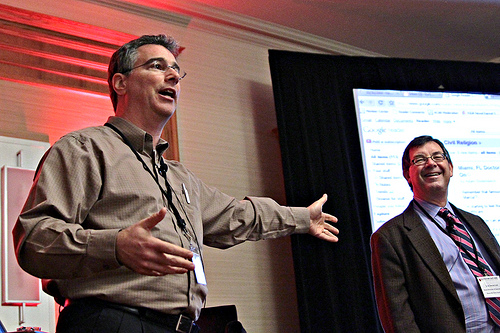On November 13, the St. Louis Post-Dispatch’s website, StLToday, asked readers to comment on a story titled, “What’s the craziest thing you’ve ever eaten?”
Soon, a commenter posted a reply that included a “vulgar, two-syllable word for a part of a woman’s anatomy,” according to an online account by Kurt Greenbaum, the paper’s director of social media. Editors at the website promptly deleted the comment, only to see the commenter repost the same word just a few minutes later.
What happened next has been the subject of discussion and debate within the world of online journalism.
For his part, Greenbaum summed it up in the title of his blog entry about the incident, “Post a vulgar comment at work, lose your job.”
Sick of the commenter’s shenanigans, he located the person’s IP address, and tracked them to a local school. Greenbaum then called school officials and told them about the comment. The school’s IT coordinator was able to pinpoint the post to a specific employee who was confronted by school officials and “resigned on the spot.”
Greenbaum, who declined to be interviewed for this story, soon published another blog post explaining his actions. He admitted that he may have overreacted by calling the school, but stated, “I am constantly frustrated by the difficulty of dealing with this kind of language” on the paper’s website.
Greenbaum’s blog entry was republished on the Post-Dispatch’s website and has received over 450 comments. In an angry response, an anonymous person created a website mocking Greenbaum, repeatedly calling him the same “vulgar, two-syllable word for a part of a woman’s anatomy” that started everything.
Aside from the ethical debate about this incident, there are two important legal questions to consider.
Can He Do That?
The first question: Is what Greenbaum did legal? Answer: yes, probably.
The paper’s privacy policy states that the Post-Dispatch and its employees “will not share individual user information with third parties unless the user has specifically approved the release of that information.”
However, the policy also states that a commenter’s IP address “does not contain personally identifiable information, nor does it identify you personally.” Thus, the Post-Dispatch would argue, Greenbaum’s use of the anonymous commenter’s IP address is not a violation of the website’s privacy policy.
Tom Curley, an attorney with the media law firm Levine Sullivan Koch & Schulz, said that the legal rules surrounding comments and message boards “can vary widely from site to site.” Curley said some websites may provide an absolute promise to not reveal any identifying information, while others may offer only conditional promises.
Additionally, websites are a form of private property, and can be managed as such.
“There are some websites that are open forums, which is perfectly fine,” Curley said. “But there is nothing that stops a website, legally, from deciding that there are some things that shouldn’t be published.”
Ethical Implications
In his blog post, Greenbaum stated that the Post does not routinely “take the steps I took in this case. For particularly bad cases of abusing our guidelines with vulgarity and obscenity, we would not rule it out.”

Malcolm Moran, a professor of media ethics at Pennsylvania State University, questioned Greenbaum’s approach. “The main ethical question I would raise in this case is: When does an editor decide the rules change?”
The Post-Dispatch’s terms of service state that the website “encourage[s] a free and open exchange of ideas in a climate of mutual respect.” However, Greenbaum’s actions could chill that climate of open exchange and mutual respect.
“What happens if a person comments about a controversial issue and has legitimate reason for staying anonymous?” Moran said. “Next time, will an editor identify that person if he or she disagrees with the commenter’s views?”
Attacking the Editor with Anonymous Speech
The second legal question is whether Greenbaum can sue the anonymous individual who created a website ridiculing him. The likely answer: no.
The anonymous website created in Greenbaum’s name is vulgar, to say the least. But that does not make it defamatory. In order to sustain a lawsuit for defamation, a plaintiff must show that the words in question state or imply false facts. Simply calling an individual a degrading name does not imply a fact at all. Rather, it is a non-actionable figure of speech.

Thomas Dienes, a professor at George Washington University Law School, said the mocking website may be in bad taste, but is not defamatory. “This case would be thrown out of court so fast that I can’t imagine a lawyer would take it,” Dienes said.
“Over the years, there have been a number of these types of websites devoted to a particular reporter. It’s rare but not unheard of,” Curley said. “Normally, the reporter just shrugs and it all blows over.”
This incident is a case study in the struggle that news organizations face when it comes to allowing anonymous speech on their websites. On one hand, this speech can be vile, cowardly, vengeful and tasteless. On the other, anonymous speech can be valuable and is also constitutionally protected.
“The tradition of anonymous speech in this country is incredibly important,” Curley said. In fact, media organizations themselves have noted the importance of confidential sources and anonymous speech.
Anonymous Speech Being Tested
Two Supreme Court cases, often referred to as Talley and McIntyre, have affirmed the idea that “an author’s decision to remain anonymous…is an aspect of the freedom of speech protected by the First Amendment.”
Although this constitutional right only exists in the context of government regulation, the importance of anonymous speech, even if it is in the form of an anonymous comment on a news outlet’s website, still holds its importance.
That does not mean, however, that all anonymous speech on the Internet is free from liability.
Recently, plaintiffs in New Jersey, South Carolina, and California asked judges to subpoena the identifying information of anonymous bloggers and commenters in order to sue them. The frequency of these types of subpoenas has reached a dizzying pace.
Generally speaking, courts have taken two different approaches in determining when to reveal the identity of an anonymous blogger or commenter. First, some courts require that a plaintiff make a “good faith” showing that the he or she has a viable lawsuit before a judge will subpoena any identifying information. These courts offer anonymous speech a particularly low level of protection, believing that everyone should have their day in court.
A second group of courts require that higher standards be met before an anonymous poster is revealed. These courts employ either the Dendrite test or the Cahill tests, as they are commonly known. The Dendrite and Cahill procedures require plaintiffs to show a litany of factors before receiving any identifying information.
The law concerning what you can and cannot anonymously publish on the Internet is undergoing change on almost a daily basis. This back-and-forth has left the legal state of anonymous speech on the Internet as uncertain at best.
Rob Arcamona is a second-year law student at the George Washington University Law School. Prior to attending law school, Rob worked at the Student Press Law Center and also helped establish ComRadio, the Pennsylvania State University’s student-run Internet-based radio station. He writes the Protecting the Source blog.


Why not simply require approval for all comments? That way objectionable content can be filtered out first.
It seems a little irresponsible of the paper to allow comments to be freely posted and then become upset when people comment freely.
Perhaps somewhere in between irresponsible and inane, actually.
One thing all employees need to keep in mind when emailing from work is that your emails are not your private property. They belong to your employer, and should comply with the employer’s standards. As a school employee, “Shenanigans” knew that and resigning looks better on a resume than dismissal. If you want to keep it private, do it in private.
Very informative article, thanks.
I just have an issue concerning the IP address statement made above by the ‘Post-Dispatch’…
“IP address “does not contain personally identifiable information, nor does it identify you personally.””
When applied to the current issues involving search engines, for example, it clearly is not true. During the AOL Search Engine debacle, it was demonstrated how easy it was to identify individuals based on their IPs if there was enough data associated with the number.
In fact, a couple of search engines based on the AOL Search Logs appeared on the net just a few days afterwards. Long story short… they made a mockery out of the supposed privacy associated with these numbers. Greenbaum himself proved that this wasn’t the case.
I wanted to draw attention to this because of the recent discussions related to data-gatherers in general and search engines in particular. The recent bombshell announcement by a CEO of the Mozilla Foundation related to Google (a long-time partner) about it’s privacy policy will continue to make this a controversial issue in the years to come.
There’s little transparency associated with the collection of data by websites. No one knows if The Post-Dispatch aggregates data based on IP addresses, for example. Whether they archive logs, etc…
Most of the websites I go to today have scripts and widgets running mini-apps from other sites. Some pages ‘call’ as many as 15 other domains. When a site owner makes a specific claim about privacy on their page/domain, I think (ianal) that it’s also responsible for the additional widgets it has running on it’s page/domain. I can trust PBS.org but maybe I don’t want to trust polldaddy.com or scoreCardResearch.com.
If I go to 20 different sites and each of those sites happen to be running the same widget (a specific advertiser-partner, for example), then that widget has collected my activity over 20 sites without providing a privacy policy, without a way of turning off that widget.
There’s alot more to this issue than just Greenbaum’s bahavior. It’s the behavior of ISPs, websites, advertisers, the government, etal… and how they’ll use this data for their, often, self-serving needs. At the very least – to manipulate end-users.
I wonder… does Steve Ballmer, Eric Schmidt, the Pentagon… allow their data to be collected?
Interesting perspective. I’m not so sure about the IP address argument and privacy, though. As noted in an earlier comment, IP addresses in conjunction with other activity can reveal much about a person.
The time when the comment was posted, and the specific IP address used was sufficient to find the person, thus the person’s actions were revealed and perhaps the most private aspect of our lives is our actions.
At a minimum, this even has shown the Paper that the IP address does reveal private information, and it should adjust its disclaimer.
What was stunning for many of us who have followed St. Louis Today is the fact that the paper allows any number of hateful, racist, and bigoted comments, but seems to have decided that the use of a vulgar word–not an obscenity, but a vulgarity–was enough to go on the war path.
As the one expert asked: when does the editor change the rules? After a comment is posted is not the ethical time to change the rules.
The paper should just require comment moderation, or, as the readers have suggested in the past, turn comments off. Frankly, though, it probably liked all this publicity, which doesn’t say anything positive about the organization.
CRIMES AGAINST POSTERITY
SWINE FLU SWINDLE
SWINES FLEW IN TOP HATS
Glaxo is just a marketing hand
so who sold that vacc to the whole world carrying seeds of the next pandemic?
What state, what monster?
When failed, getting away to try again?
Like Oklahoma
your comment must be approved by
OH YEAH?
guess where all the internet monitoring flows to and you guessed where that vaccine maker sits
According to a list compiled by Dr. Patricia Doyle at rense.com, a host of strange ingredients are used to make up Hoffman-La Roche’s anti-flu drug Tamiflu, which has recently been connected with bizarre behavior,
Patients using Tamiflu — which many nations are stocking up on as a way to combat a possible pandemic of the deadly H5N1 bird flu — reported delirium, hallucinations, delusions, convulsions, disturbed consciousness and abnormal behavior. The FDA reports that side effects reported with Tamiflu include nausea, vomiting, diarrhea, bronchitis, stomach pain, dizziness and headache.
ANTI-MONOPOLISTS VERY QUIET ON JUST ONE FIRM ”SERVING” THE WHOLE WORLD
COMING SOON FROM THE SAME CREEPS: CARBON SIN RELIC INDULGENCES, PAYABLE GUESS TO WHOM.
Hint 1, it never was the Pope.
Hint 2, when exposed with biggest fake relics collection ever, the perpetrators protest laudest and become The Reformation Crowd.
Hint 3, See Barnum’s Humbugs of all times 1860 book, chapter on Moon Hoax